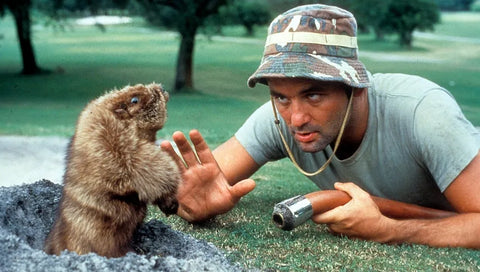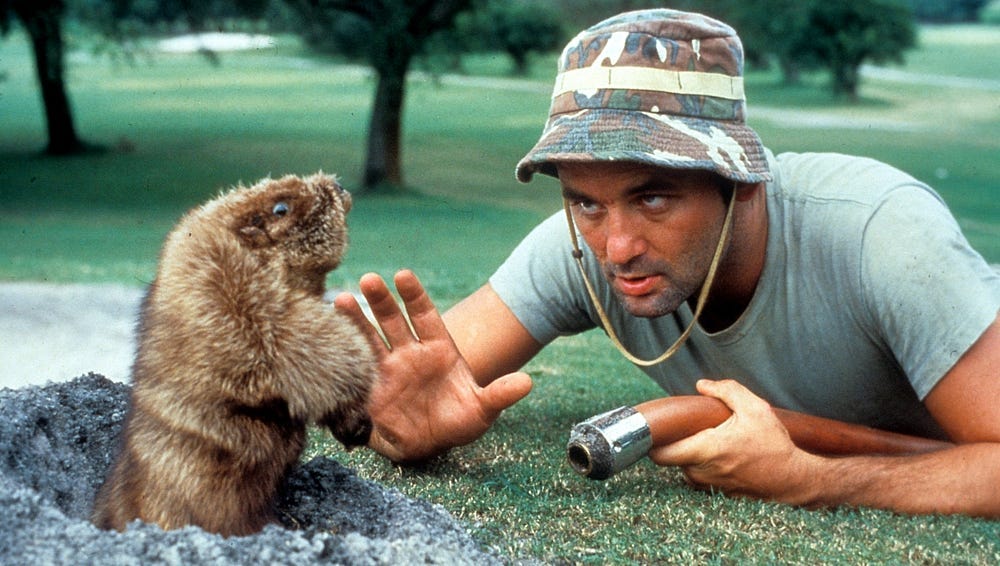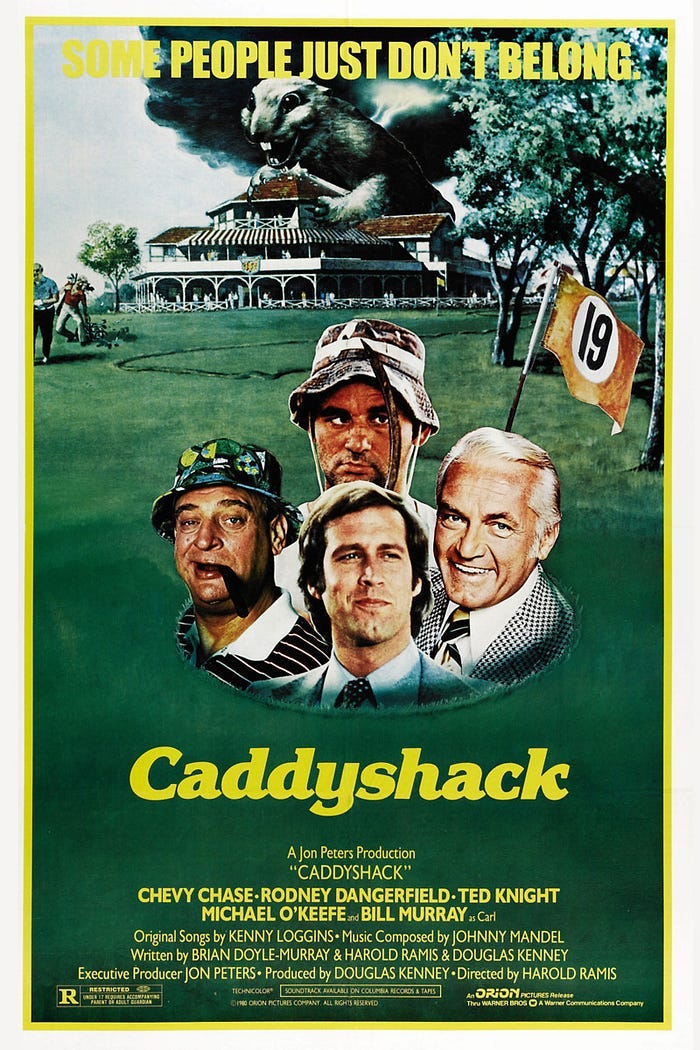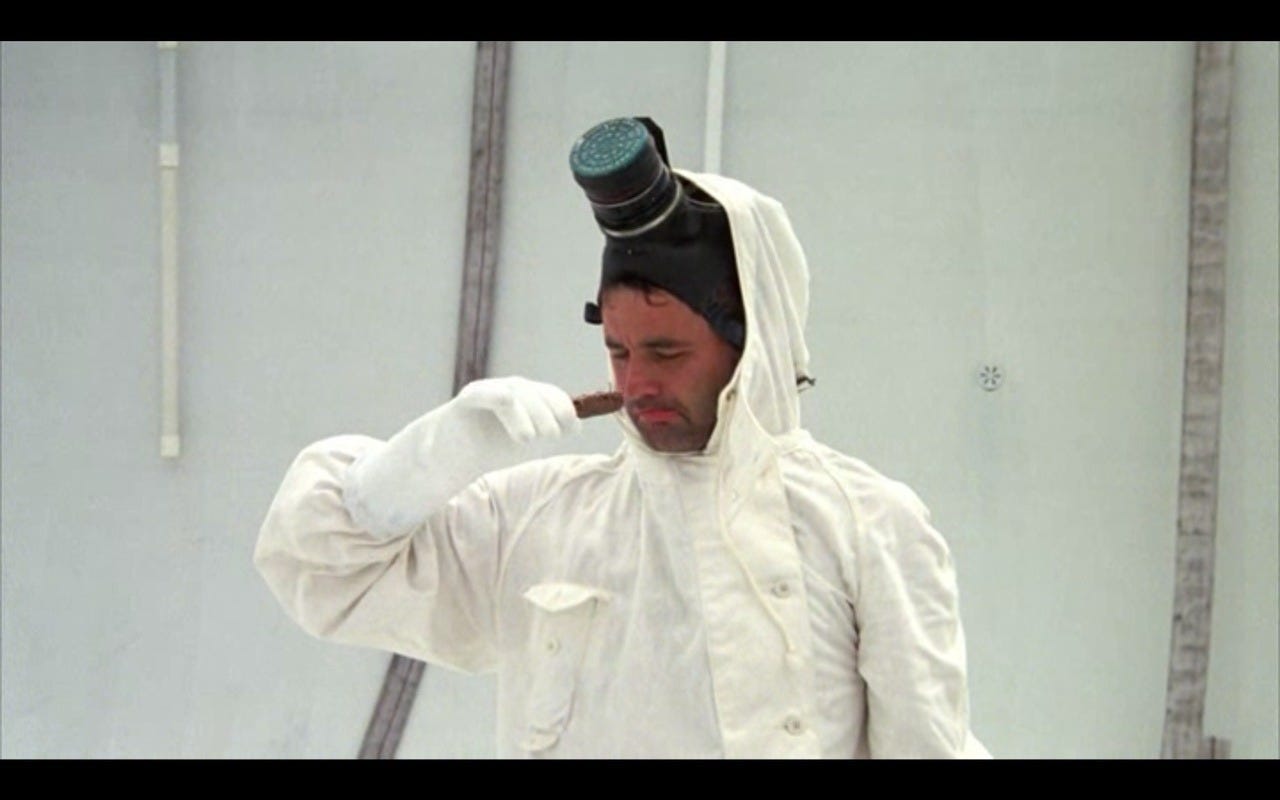
What Caddyshack Got Right About Elon’s America
How Elon Drained the Pool in Search of Doodies!
The pool is finally empty, and Elon Musk stands alone at the bottom, clutching a Baby Ruth candy bar. He looks up as the world watches, smiling (I think), and then he jumps awkwardly. I think he is dancing, but I can't tell. Either way, he is at the bottom, and the world is waiting to see him take a bite.
As a kid, I genuinely believed that all adults behaved precisely like those in Caddyshack. Every student wandered through life like those carefree caddies, and every boss was the grumpy little guy with the moustache behind the counter, barking orders. Every hero had a nemesis, and every villain was someone weaker to push around. Watching Caddyshack as a ten-year-old wasn’t just funny — it felt disturbingly accurate.
My parents ran an indoor cricket centre, and bizarrely, Caddyshack characters seemed to populate my everyday reality. They were everywhere — a strange foreshadowing of adulthood. I distinctly remember wanting to be Ty Webb — cool, detached, seemingly above all. But the person I never wanted to be? Spalding, the whiny, entitled brat demanding, “I want a hot dog. No, a hamburger. No, a cheeseburger.” Only for his father to shut him down, “You’ll get nothing and like it.” To this day, whenever someone orders a hot dog, that line still echoes in my head.
But Caddyshack didn’t just capture people; it captured power structures. Bushwood Country Club was a microcosm of society — the elites made the rules, the caddies tried to break them, and the rogue forces (Carl Spackler, Al Czervik) wreaked havoc on the whole system. That, more than anything, feels eerily like governments today.
There was a time when Elon Musk wasn’t my Carl Spackler. He was my Batman — the billionaire genius who would save the world. But like many illusions, reality eventually set in.
Now, every time Musk launches into one of his deranged Twitter rants or pumps up DOGE as the future of efficiency, I picture Bill Murray’s Spackler, eyes glazed over, muttering:
Musk, like Spackler, is a force of chaos disguised as a hero. He doesn’t fix things — he blows them up. He doesn’t build systems and dismantles them under the guise of efficiency. He’s the guy who sees a gopher (a metaphor for government regulation) and decides the best way to handle it is by planting explosives all over the golf course. With great power comes great responsibility (was that a Batman quote?)!
And when the whole place inevitably goes up in flames? He shrugs and moves on to the next course. I don’t think; in the end, there will be total consciousness; in fact, I don't think there is much right now, either.
Do you remember the pool Scene in Caddyshack?
A Baby Ruth candy bar gets tossed into the country club pool resembling a floating turd (or doody!) — cue mass hysteria. People scream. They flee in terror. The pool is evacuated. Finally, Carl Spackler (The amazing Bill Murray), ever the problem-solver, drains the entire thing — to discover that, in the end, it was only a Baby Ruth candy bar and not a doody.
The chaos merchants of a modern America and the entire post-truth movement — love tossing metaphorical Baby Ruths into the pool, whipping up outrage while real problems — income inequality, climate change, democratic erosion — float by unnoticed.
And Elon, now a self-appointed expert in governance, wants to drain the pool. For efficiency.
At best, Elon’s vision of government is a fever dream of tech libertarianism. No oversight. No regulations. Just “free-market” solutions, run by whoever yells the loudest on Twitter (Sorry “X”)!
To him, the government isn’t about maintaining the golf course, it’s about dynamiting it for fun and blowing shit up, irrespective of where the pieces might land.
Of course, no one wants a bloated bureaucracy (in the same way, no one wants doodys floating in the pool). In Australia, we call these a floater!
We all want cleaner, smarter, more efficient systems and governments. But what happens when you drain the entire pool and nothing is left but an empty bowl and a stodgy candy bar (somewhat resembling a floater)? Sure, we get a good Skate bowl for the youth of the future, and whilst I love to skate, most of the places worth skating are often abandoned. This may be the perfect metaphor for where the US is heading.
I’ve sat behind the curtain of some of the world’s largest companies. They are complex, and the people who make them turn are extraordinary—think of Nike, Canon, Westpac, Gulf, BHP, and Australia Post. Sure, I’ve looked for inefficiencies, streamlined operations, and identified what stays and what goes, and I’ve also examined opportunities, scale, and influence. I know the power of disruption but also understand the cost of doing it without empathy.
In 2017, I was invited into the tent with Australia Post, an institution bleeding $9.6 million per week due to the collapse of traditional mail and old systems. We proposed ideas (some of the greatest ideas anyone has ever seen; no one had ever seen ideas like them; they were the most incredible ideas in the history of ideas… ahem), but a straightforward solution seemed obvious: kill stamps, end mail, and move entirely digital.
Enter Christine Holgate, Australia Post’s then-CEO. Smart, strategic, but above all, empathetic. She listened to our recommendations, but she pushed back:
“Innovation is crucial, but empathy is equally vital. Disruption should inspire hope, strengthen communities, and build trust — not dismantle it.”
At first, it frustrated me. I wanted to can the stamp — blow it up, kind of like a Gopher on a gold course. Sure, I respected the stamp’s history (kind of), but it was old, inefficient, and expensive. Print, ship, store, lick, and stick it — all at the cost of millions. It’s pretty inefficient.
But Christine was right. Disruption without empathy is destruction. It doesn’t build — it breaks. And what’s left? Confused people, broken systems, and people who spent a lifetime creating something only to watch it get dismantled overnight.
We weren’t asked to take the easy route; we were asked to find the right one. And if I have learned anything about business, it is that finding the right path is hard. I am still trying to find mine!
We think of disruption as innovation or growth. But disruption is nothing more than what it is — disruption. It always affects someone, somewhere.
Rhonda Brighton-Hall is one of my most treasured friends — hands down, the best leader I’ve ever worked with. Over the years, she’s given me countless gifts in the form of generous conversations, but one stands out:
“Great leaders understand their ‘wake’ — the human impact they leave behind. Disruption must uplift people, not destroy them.”
Now, compare that to Elon, who, in a conversation with Joe Rogan, recently said, “The fundamental weakness of Western civilisation is empathy.”
In response, in a recent episode of Pivot, Kara Swisher replied with, “He’s so poor — all he has is money.”
That’s the difference between leaders like Holgate, Swisher, and Rhonda and people like Musk. One understands that efficiency isn’t just about cutting but knowing what to keep. The other drains the pool and leaves everyone wondering where the water went.
As Spackler drains the pool, convinced he’s saving it from contamination, I picture Musk standing there, ankle-deep in the empty basin, candy bar in hand, waiting for the world to marvel at what he’s uncovered.
But as the rest of the world watches, nations standing together — stronger and more connected than ever — we realise it’s not the planet drained. It’s America.
And there, gripping the pool ladder with one hand, Donald Trump, full Rodney Dangerfield mode, rattles off useless one-liners, oblivious to the wreckage. The country he swore to save now stands empty, exhausted, holding the bag — and in his final words, he says something about fake news and then blames the windmills (it is ok; no one else understood it either).
Caddyshack ends in an explosion, and everyone laughs. But this isn’t a movie, at least for now; no one is shouting cut! We need to start refilling the pool — rebuilding governance with balance, empathy, and community — we won’t laugh when we realise the wealthiest man on Earth is standing at the bottom of an empty pool with nothing left but his own company and a Baby Ruth candy bar that everyone else mistook for a piece of shit! But not Elon; he got to the bottom of it, and the chances are, he will probably start gnawing away at that, too!
Disclaimer: This article was written by Ben Rennie as an original article and edited with Grammarly AI and editing tools.



